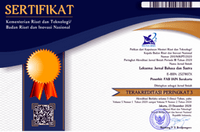DISFLUENCIES IN STAND-UP COMEDY: A PSYCHOLINGUISTIC ANALYSIS ON DREW LYNCH'S STUTTERING
DOI:
https://doi.org/10.22515/ljbs.v5i1.2075Keywords:
disfluency, fluency disorder, stand-up comedy, stutteringAbstract
Difficulties of producing speech sound in stutterers are indicated by the repetition, pause, prolongation, revision, and filled pause on the speaking. However, such difficulties do not hinder the communication as shown in the speech of a stand-up comedian named Drew Lynch. This study aims at exploring the types of fluency disorder identified in Lynch’s utterances on stage. This study uses the descriptive qualitative method employed through the process of observing, transcribing, describing, and analyzing his utterances in American Got Talent videos. The result shows Lynch produces all kinds of disfluency covering filled pause, phrase repetition, revision, multisyllabic whole-word repetition, monosyllabic whole-word repetition, repetition of individual sound or syllable, prolongation of sound, and block. The monosyllabic whole-word repetition is more dominant. The combination happens between revision with monosyllabic whole-word repetition, prolongation, or multisyllabic whole-word repetition. These findings confirm that in the context of stand-up comedy, the disfluencies in stuttering do not hamper the transfer of meaning.
References
American Speech-Language Hearing Associations (ASHA). 2017. Stuttering. https://www.asha.org/public/speech/disorders/stuttering.htm
Aronson, AE & DM Bless. 2009. Clinical Voice Disorders. New York: Thime Medical Publisher, Inc.
Birth Injury Guide. 2017. Speech Pathology for Infant. https://www.birthinjuryguide.org/ birth-injury/treatment/speech-pathology/
British Stammering Association. 2017. What Causes Stammering. https://www. stammering.org/earlyyears/learn-more-about-stammering/what-causes-stammering
Choo, AL & S Smith. 2019. “Bilingual Children Who Stutter: Convergence, Gaps and Directions for Research. Journal of Fluency Disorders, 105741
Cincinnati Children’s. 2018. Speech Disorders. https://www.cincinnatichildrens.org/ health/s/speech-disorder#contentmaster_1_pagemaincontent_1_columnprimary_1 _rptAccordion_pnlSectionBody_0
CLSD. 2018. Articulation and Phonological Disorders (Speech Sound Disorders). https://csld.org/articulation-and-phonological-disorders-speech-sound-disorders
Communication Disorder Clinic. University of Central Florida. 2018. Fluency Disorders. https://www.cohpa.ucf.edu/clinic/comprehensive-evaluation/fluency-disorders/
Constantino, CD, WH Manning & SN Nordstrom. 2017. “Rethinking Covert Stutteringâ€. Journal of Fluency Disorders, 53: 26-40
Fraser, M. 2007. Self-Therapy for the Stutter. Tennessee: Stuttering Foundation of America
Indah, RN. 2017. Gangguan Berbahasa: Kajian Pengantar. Malang: UIN Malang Press
Lanier, W. 2010. Speech Disorders. Farming Hills: Lucent Books
Lavid, N. 2003. Understanding Stuttering. New York: University Press of Mississippi.
Manning, Walter H. 2009. Clinical Decision Making in Fluency Disorder. Tennessee: The University of Memphis
Nugraha, ASN. 2012. A Psycholinguistics Analysis on a Stuttering Character in Rocket Science (Unpublished Thesis). Yogyakarta: Yogyakarta State University
Sari, DI. 2014. Stuttering Portrayed in The King Speech Movie (Unpublished Thesis). Malang: State University of Malang
Sasisekaran, J & Weathers, E. 2019. “Disfluencies and Phonological Revisions in a Nonword Repetition Task in School-age Children Who Stutter." Journal of Communication Disorders, 105917
Schultz, T, M Wand, T Hueber, DJ Krusienski, C
Herff & JS Brumberg. 2017. “Biosignal-based Spoken Communication: A Surveyâ€. IEEE/ACM Transactions on Audio, Speech, and Language Processing, 25: 2257-2271
Seth, D & S Maruthy. 2019. “Effect of Phonological and Morphological Factors on Speech Disfluencies of Canada Speaking Preschool Children Who Stutterâ€. Journal of Fluency Disorders, 61: 105707
Sleeper, AA. 2007. Speech and Language. New York: Infobase Publishing
Ward, D. 2006. Stuttering and Cluttering: Frameworks for Understanding and Treatment. New York: Psychology Press
Zebrowski, PM. 2003. “Developmental Stutteringâ€. Pediatric Annals, 32 (7): 453-458
Downloads
Published
Issue
Section
License
The copyright of the received article shall be assigned to the publisher of the journal. The intended copyright includes the right to publish the article in various forms (including reprints). The journal maintains the publishing rights to published articles.
In line with the license, the authors and users (readers or other researchers) are allowed to share and adapt the material only for non-commercial purposes. In addition, the material must be given appropriate credit, provided with a link to the license, and indicated if changes were made. If authors remix, transform or build upon the material, authors must distribute their contributions under the same license as the original.








